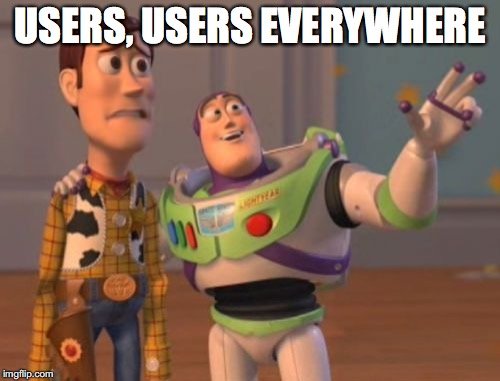
If you run a user-centric business, the value of that business is directly related to the number and quality of your users. It’s obvious, I know, but it’s also something quite easy to ignore, once you start to get involved in the day to day operations.
A good example of a user-centric business is a a content site (like a business or fashion blog), a membership site or - if I may - a blockchain based social media network, like Steemit.
On the other hand, a customer-centric business may be, for instance, an online shop, where you don’t necessarily need to build rich relationships with your clients, and where the value comes from selling various stuff (most of the time, not made by you). Of course, you still need to interact with your customers and to build relationships, but most of the times, those relationships will be linked to sales processes (usability, customer satisfaction, etc).
In a user-centric business, you build much richer relationships. Your primary concern is not related to the sale itself, but to the way your content (or your service) is consumed. In a way, in a user-centric business, the selling is continuous, it’s not a one-time process, it happens from the moment they entered your ecosystem, until they leave.
So I think it’s safe to say that in this business you sell and buy, most of the time, attention. So, the more attention you can foster, the more revenue you can generate. Simple, right? Yes, as long as you have those users.

How Do You Get Users?
There are basically 2 ways of getting users: you either buy existing users, by sucking their attention from other content providers, or you build them, which is basically raising them from the very beginning.
In the first case you’re actively focusing and spending resources on outside channels, trying to lure in educated users, in the second you’re focusing internally and spending resources in growing your own user base. Most of the time, your entire service will also grow at the same time with your user base. It will be some sort of synergy.
Knowing which type of strategy to adopt is very important and, obviously, it’s also quite difficult, because each strategy has pros and cons and at various stages in your business, one may be better suited than the other one.
For instance, buying users can prove very useful if you’re trying to move very fast. I personally know of some gaming startups which evolved very, very fast and basically exploded (huge and well deserved success), but their initial user base was simply bought, not organic.
On another hand, if you want to create some a powerful affinity to your brand, it’s much better to go slowly and let them grow organically. In certain types of businesses, such as coaching or consulting, this is the only reliable way to go and trying to buy users will simply prove inefficient (if not stupid).
I only have experience in growing audiences organically, the slow way, but I’m not fundamentally against buying users, if it’s made ethically (letting users know why they’re getting that voucher, or that membership, etc). As a user, I started consuming a few services after being invited (receiving some sort of gift) but I cant't remember any specific service right now - which means my involvement didn’t last much.
A Somehow Freaky Example
I don’t know if you know that already, but Facebook recently expressed some sort of interest in starting operations in China. Google shut down in 2010 in China, after declaring it can’t comply with data privacy (or, in better words, they can’t enforce the breach in data privacy) expressed by Beijing. A few other companies had their ins and outs with the Chinese government, including big names, like Yahoo. It’s a very tough market to enter if you’re a social media company, relying only on user input to create content. Not to mention the local competition from WeChat.
So, why would Facebook, with a 1.6 billion user base, will want to enter a new market, at such a big cost? Because will be very costly to enter there, if only for the ethical standpoint.
Well, my hunch is that Facebook realized they ran out of users to “buy”, while China grows them much faster. In other words, the rate at which Facebook may grow at this moment will be slower than China rate of natality.
At 1.3 billion people, China already has the biggest user base in the world. And they don't have to do anything, but keep replicating themselves.
Which of course, has some huge challenges but, the bottom line is: China doesn't need to enter any market, because they are already the biggest market on Earth.
So Facebook’s choice is not to enter this market, but how much to pay now in order not to be crushed by it in 5 or 10 years.
This post is part of a 30 days challenge on business, you can find the entire list of articles here.
I'm a serial entrepreneur, blogger and ultrarunner. You can find me mainly on my blog at Dragos Roua where I write about productivity, business, relationships and running. Here on Steemit you may stay updated by following me @dragosroua.

